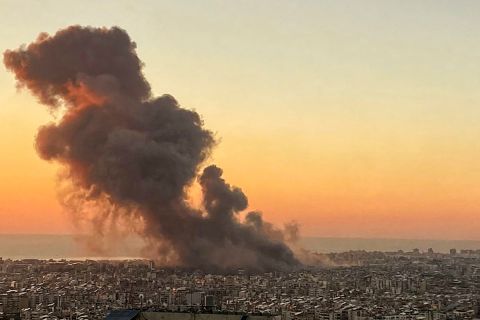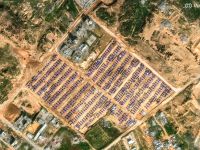ALBAWABA - In a significant escalation, the Israeli military confirmed on Friday that it had bombed Hezbollah’s central headquarters in Beirut's southern suburbs, with reports suggesting the primary target was the group’s Secretary-General, Hassan Nasrallah.
In the wake of the airstrikes, Reuters quoted a source close to Hezbollah confirming that Secretary-General Hassan Nasrallah is alive. Additionally, Iran’s Tasnim News Agency cited security sources, stating that Nasrallah is in a safe location, dismissing Israeli media reports as inaccurate.
Former Iranian Quds Force commander Ahmad Vahidi added to the uncertainty surrounding Nasrallah’s fate, stating, “Hezbollah has trained many leaders, and for every martyr, another leader will emerge.” This sentiment was echoed by Ali Larijani, an advisor to Iran’s Supreme Leader, who said, “The resistance has strong leaders and cadres, and for every martyred leader, there will be a replacement.”
These remarks have fueled speculation that Nasrallah may have been killed in the Israeli airstrikes, with some interpreting them as preparatory messages ahead of an official announcement regarding his fate.
Israeli military spokesperson Daniel Hagari announced that the air force conducted strikes on Hezbollah’s main command center, reaffirming Israel’s intent to continue targeting what it deems "terrorist threats" from Lebanon.
Israeli intelligence has not ruled out the possibility that several senior commanders from Iran’s Quds Force may have also been killed in the strike. However, no confirmation of Nasrallah's death has been provided.
The Israeli newspaper Maariv reported that military sources believe the assassination of Nasrallah could have been successful, while Channel 12 stated that Israel had been planning this operation for some time, and the strike was carried out after receiving critical intelligence.
Meanwhile, Al Jazeera's Lebanon bureau chief, Mazen Ibrahim, noted that Hezbollah has maintained complete silence regarding the attack. Efforts to obtain clarification have been unsuccessful, and sources close to the group indicated that there is no immediate plan to issue a statement.
Amid speculation about Nasrallah’s fate, Reuters, citing a source close to Hezbollah, confirmed that the Secretary-General is alive. Similarly, Iran’s Tasnim News Agency, quoting security sources, reported that both Nasrallah and Hashem Safi al-Din, Hezbollah’s Executive Council Chairman, are in a safe location, dismissing Israeli media claims as inaccurate.
Israeli media reported that 2,000-pound bunker-busting bombs were used during the strikes on Beirut’s southern suburbs, which caused significant destruction.
Israel’s public broadcaster Kan reported that Israel informed the United States ahead of the operation. Additionally, Israel’s defense systems, intelligence units, and emergency services have been placed on maximum alert in anticipation of possible retaliation from Hezbollah. Shelters across Israel have also been opened as a precaution.
A Lebanese medical source informed Al Jazeera that the Israeli airstrikes resulted in multiple casualties, including fatalities and injuries in Beirut’s southern suburbs.
Lebanon’s Ministry of Health reported an initial toll of two dead and 76 injured in Harat Hreik following the strikes. The ministry warned that casualty numbers could rise as search efforts continue.
Al Jazeera’s correspondent reported ten explosions across the southern suburbs during the evening, with strikes targeting areas near the airport road, Bir Hassan, and the vicinity of Al-Zahraa Hospital.
The correspondent described the strikes as the most intense the southern suburbs have seen in the current conflict, with several buildings flattened and thick smoke rising over Harat Hreik and other areas.
Extensive damage was reported in Harat Hreik, where four buildings were completely destroyed, and many residential buildings were significantly damaged.










